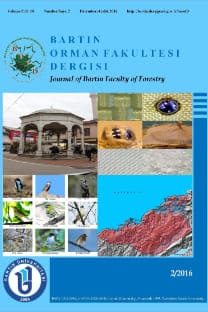Endüstri 4.0 ile Akıllı ve Doğal Tarım
Intelligent and Natural Agriculture with Industry 4.0
Industry 4.0, Internet of Things, Robotic Agriculture Systems,
___
- 1. Akay, M. (2018). Endüstri 4.0 İle Akıllı Tarıma Geçiş.
- 2. Aktan, C.C. (2008). Stratejik Yönetim ve Stratejik Planlama, Çimento İşveren Dergisi, 22(4), 7.
- 3. Duckett, T., Pearson, S., Blackmore, S., & Grieve, B. (2018). Agricultural Robotics: The Future of Robotic Agriculture. Retrieved from www.ukras.org
- 4. Brown, L.R. (1997). Facing the challenge of food scarcity: Can we raise grain yields fast enough? In: Ando T., Fujita K., Mae T., Matsumoto H., Mori S., Sekiya J. (eds) Plant Nutrition for Sustainable Food Production and Environment. Developments in Plant and Soil Sciences, vol 78. Springer, Dordrecht
- 5. Dexia Asset Management (2010). Food Scarcity- Trends, Challenges, Solutions.
- 6. FAO (2017). The future of food and agriculture – Trends and challenges. Rome.
- 7. Kahraman, M. (2019). Endüstri 4.0’la Birlikte Gelen Akıllı Tarım, https://www.endustri40.com/endustri-4-0la-birlikte-gelen-akilli-tarim/
- 8. Madeira, J. (2017). Compta and Grundfos organize an international IoT event in Portugal, https://www.ceb-solutions.com/compta-grundfos-organize-international-iot-eventportugal/
- 9. Meola, A. (2016). Why IoT, big data & smart farming are the future of agriculture, https://www.businessinsider.com/internet-of-things-smart-agriculture-2016-10.
- 10. Paravan, C. (2016). Leveraging new opportunities in the fertilizer industry, https://blogs.siemens.com/en/competitive-industries.entry.html/28288-leveraging-newopportunities-in-the-fertilizer-industry.html.
- 11. Robotics Online (2017). “Robotics in Agriculture: Types and Applications”, https://www.robotics.org/blog-article.cfm/Robotics-in-Agriculture-Types-and-Applications/74, 7 Kasım, 2019.
- 12. Sachsenmeier, P. (2016). Industry 5.0-The Relevance and Implications of Bionics and Synthetic Biology, Engineering, 2, 225-229.
- 13. Schwab, K. (2016). The Fourth Industrial Revolution. Switzerland: World Economic Forım.
- 14. Sezer, F (2018). Endüstri 4.0’ın Gıda Kıtlığı Sorununa Olası Etkileri, 4th SCF International Conference on “Economic and Social Nevsehir Impacts of Globalization” and “Future of Turkey-EU Relations”, 26 April, 182-187.
- 15. Stern, N. (2006). The Stern Review on the Economics of Climate Change. Government of the United Kingdom.
- 16. World Economic Forum (WEF) (2018). Innovation with a Purpose: The role of technology innovation in accelerating food systems transformation. https://www.weforum.org/reports/innovation-with-a-purpose-the-role-of-technologyinnovation- in-accelerating-food-systems-transformation.
- ISSN: 1302-0943
- Yayın Aralığı: Yılda 3 Sayı
- Başlangıç: 1998
- Yayıncı: Bartın Üniversitesi Orman Fakültesi
Marmara Bölgesi Orman Fidanlıklarının Odunsu Bitki Envanteri ve Niteliksel Olarak Değerlendirilmesi
Ş. Doğanay YENER, Nilüfer SEYİDOĞLU AKDENİZ
Türkiye Mobilya ve Levha İşletmelerinde Verimlilik Algısı Üzerine Bir Araştırma
Ahmet Bora KIRKLIKÇI, Tarık GEDİK
Deniz İçi ve Sahilde Bekletilen Emprenye Edilmiş Lamine Ağaç Malzemenin Eğilme Direnci
Şemsettin DORUK, Osman PERÇİN, Hüseyin YÖRÜR
Geleneksel Bahçe ve Mimari Üslubun Ortaya Çıkışında Doğal Faktörlerin Rolü: İran Örneği
Hande Sanem ÇINAR, Reyhan ERDOĞAN
Açık ve Yeşil Alanların Çok Ölçütlü Algı Değerlendirmesi
Elvan ENDER ALTAY, Zeynep PİRSELİMOĞLU BATMAN
Bartın İli Kozcağız Yöresindeki Bir Sekonder Mera Alanının Bazı Özelliklerinin Belirlenmesi
Şahin PALTA, Ayşe GENÇ LERMİ, Mustafa YİĞİT
Ahmet TOLUNAY, Alp KÜÇÜKCOŞKUN, Türkay TÜRKOĞLU, Mehmet ÖZMIŞ
Konya Kapalı Havzası Orman, Mera ve Tarım Alanlarının Değerlendirilmesi
Ayhan ATEŞOĞLU, Talha Berk ARIKAN, Saffet YILDIZ
Emprenye ve Üst yüzey İşlemi Uygulanmış Ceviz Ağaç Malzemenin Yanma Özelliklerinin Belirlenmesi
